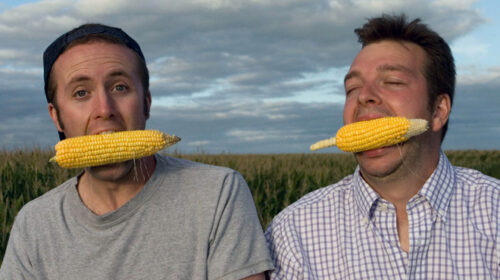King Corn

Two recent college graduates plant a single acre of the nation's most powerful crop--corn--and set out to follow it on its journey from a seed to the dinner plate.
Awards & Recognition
Winner
2008 Peabody Awards - George Foster Peabody Award
Behind America’s dollar hamburgers and 72-ounce sodas is a key ingredient that quietly fuels our fast-food nation: corn. In King Corn, recent college graduates Ian Cheney and Curt Ellis head to rural Iowa, where they decide to grow an acre of the nation’s most ubiquitous crop.
Alarmed by signs of America’s bulging waistlines, the filmmakers arrive in the Midwest enthusiastic about their new endeavor. For their farm-to-be, they choose a tiny town in Floyd County, Iowa. They lease an acre of land from a skeptical landlord, fill out a pile of paperwork to sign up for subsidies, and discover the U.S. government will pay them 28 dollars for their acre. Ian and Curt start the spring by injecting ammonia fertilizer, which promises to increase crop production four-fold. With a rented high-tech tractor, they plant 31,000 seeds in just 18 minutes. Their corn has also been genetically modified for another yield-increasing characteristic: herbicide resistance. When the seedlings sprout from Iowa’s black dirt, Ian and Curt apply a powerful herbicide to ensure that only their corn will thrive on their acre.
With their crop growing head-high, Ian and Curt leave the farm to see where America’s abundance of corn ends up. As they enter America’s industrial kitchen, they are forced to confront the realities of their crop’s future. In Brooklyn, it sweetens the sodas of a diabetes-plagued neighborhood. In Colorado, it fattens 100,000 cattle at a feedlot. Ian and Curt are increasingly troubled by how the abundance of corn is helping to make fast food cheap and consumers sick, driving animals into confinement and farmers off the land.